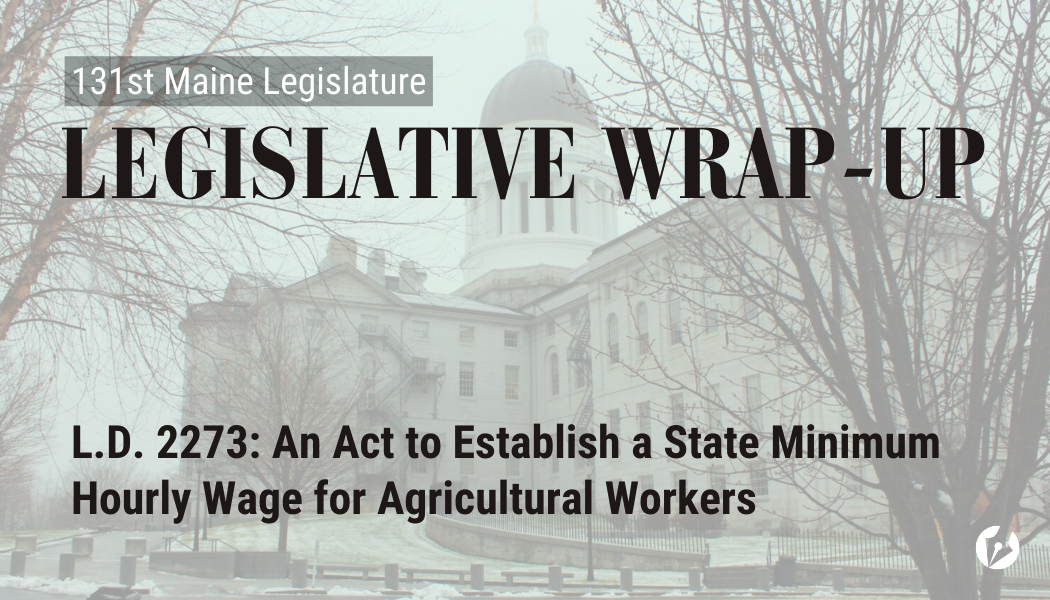For the second straight year, Gov. Janet Mills vetoed legislation that would have established a minimum wage for farm workers despite expressing support for the legislation’s goals.
This time she vetoed her own bill after it was amended by the legislature.
After last year’s veto, Mills created a stakeholder group. That group’s recommendations formed the basis of the new legislation. Testimony indicated that both labor groups and farm owners were ultimately in favor of the compromise bill, despite some qualms.
That bill was later amended in response to testimony from trial attorneys, the ACLU and others who complained it gave the Department of Labor the sole right to bring legal action against farm owners who violated the new labor laws.
The amended legislation removed that provision, allowing farm workers themselves to bring lawsuits against employers for violations, a right guaranteed to workers in other industries. It was then sent to Mills, who vetoed the bill.
In a letter to the legislature, Mills said her office had informed the committee of her concerns, and even “offered compromise language.”
But lawmakers amended the bill anyway. Mills said that change prompted her veto and led the Maine Potato Board to withdraw its support.
“I do not want to veto this bill,” Mills wrote. “But the legislature’s actions leave me little choice. I do not believe Maine farmers should face the prospect of privately initiated lawsuits, which would almost certainly lead to losing more farms in the long run.”
Read the full bill on the legislature’s website.
If you’d like to get a better sense of the discussion around this bill, here are some excerpts from testimony. (Note that these occurred before the bill was amended to allow farm workers to sue employers directly.)
For:
“We are encouraged that after nearly 90 years of farm workers being excluded from basic economic rights, that this legislation would bring Maine’s agricultural workers up to Maine’s minimum hourly wage of $14.15 beginning in September of 2024. … Farm workers never should have been exempted from Maine’s minimum wage in the first place.” ~ Mark Brunton, Maine Service Employees Association
“This is a compromise bill. lt does not provide everything that the sponsors originally proposed, and it does not account for all the considerations that many in the agricultural community sought. l thank Gov. Mills for putting forward a bill to deliver state minimum wage to farm workers while also understanding and accounting for many of the concerns raised by members of the agricultural community.” ~ Eric Venturini, Wild Blueberry Commission of Maine
“The historic exclusion of agricultural workers from labor protections is rooted in a legacy of systemic racism. When the Fair Labor Standards Act of 1938 (FLSA) was passed, the exclusion of farm workers from labor protections was a ‘race neutral’ method of maintaining significant racial disparities, as agricultural workers were disproportionately Black. … When Maine passed its first comprehensive state minimum wage law in 1959, lawmakers followed national trends and exempted occupations where people of color were more likely to work.” ~ Rae Sage, Permanent Commission on the Status of Racial, Indigenous, and Tribal Populations
Against:
“From our perspective, not only is it patently wrong and unfair to allow some employees (e.g. nurses, teachers, retail workers, landscapers, etc.) to bring wage and hour claims in Maine courts while denying this right to farm workers, but there are latent dangers associated with allowing this provision in the legislation to survive passage into law. Among them is the risk that more laws will be introduced and enacted that limit peoples’ access to the courts, jury trials and our civil justice system.” ~ Lauri Boxer-Macomber, Maine Trial Lawyers Association







